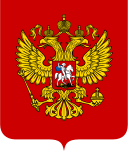| Russian Federation
Российская Федерация
Rossiyskaya Federatsiya | ||||||
|---|---|---|---|---|---|---|
| ||||||
| Anthem: "Государственный гимн Российской Федерации" "Gosudarstvenny gimn Rossiyskoy Federatsii" (transliteration) "State Anthem of the Russian Federation" | ||||||
|
| ||||||
| Capital and largest city |
Moscow 55°45′N 37°37′E / 55.750°N 37.617°E | |||||
| Official languages | Russian official throughout the country; 27 other languages co-official in various regions | |||||
| Ethnic groups (2010[1]) | ||||||
| Demonym | Russian | |||||
| Government | Federal semi-presidential constitutional republic | |||||
| - | President | Vladimir Putin | ||||
| - | Prime Minister | Dmitry Medvedev | ||||
| Legislature | Federal Assembly | |||||
| - | Upper house | Federation Council | ||||
| - | Lower house | State Duma | ||||
| Formation | ||||||
| - | Kievan Rus' | 882 | ||||
| - | Grand Duchy of Moscow | 1283 | ||||
| - | Tsardom of Russia | 16 January 1547 | ||||
| - | Russian Empire | 22 October 1721 | ||||
| - | Russian SFSR | 6 November 1917 | ||||
| - | Part of Soviet Union | 10 December 1922 | ||||
| - | Russian Federation | 25 December 1991 | ||||
| Area | ||||||
| - | Total | 17,098,242 km2 (1st) 6,592,800 sq mi | ||||
| - | Water (%) | 13[2] (including swamps) | ||||
| Population | ||||||
| - | 2013 estimate | 143,500,000[3] (9th) | ||||
| - | Density | 8.4/km2 (217th) 21.5/sq mi | ||||
| GDP (PPP) | 2012 estimate | |||||
| - | Total | $ 3.380 trillion[4]) (5th) | ||||
| - | Per capita | $23,549[5] (43rd) | ||||
| GDP (nominal) | 2012 estimate | |||||
| - | Total | $2.014 trillion[6]) (8th) | ||||
| - | Per capita | $14,037[7] (50th) | ||||
| Gini (2008) | 42.3[8] medium · 83rd | |||||
| HDI (2013) | high · 55th | |||||
| Currency | Russian ruble
(RUB) | |||||
| Time zone | (UTC+3 to +12a) | |||||
| Date format | dd.mm.yyyy | |||||
| Drives on the | right | |||||
| Calling code | +7 | |||||
| ISO 3166 code | RU | |||||
| Internet TLD | ||||||
| a. | Excluding +5. | |||||
The nation's history began with that of the East Slavs, who emerged as a recognizable group in Europe between the 3rd and 8th centuries AD. Founded and ruled by a Varangian warrior elite and their descendants, the medieval state of Rus arose in the 9th century. In 988 it adopted Orthodox Christianity from the Byzantine Empire, beginning the synthesis of Byzantine and Slavic cultures that defined Russian culture for the next millennium. Rus' ultimately disintegrated into a number of smaller states; most of the Rus' lands were overrun by the Mongol invasion and became tributaries of the nomadic Golden Horde. The Grand Duchy of Moscow gradually reunified the surrounding Russian principalities, achieved independence from the Golden Horde, and came to dominate the cultural and political legacy of Kievan Rus'. By the 18th century, the nation had greatly expanded through conquest, annexation, and exploration to become the Russian Empire, which was the third largest empire in history, stretching from Poland in Europe to Alaska in North America.
Following the Russian Revolution, the Russian Soviet Federative Socialist Republic became the largest and leading constituent of the Soviet Union, the world's first constitutionally socialist state and a recognized superpower, which played a decisive role in the Allied victory in World War II. The Soviet era saw some of the most significant technological achievements of the 20th century, including the world's first spacecraft, and the first astronaut. The Russian Federation became the successor state of the Russian SFSR following the dissolution of the Soviet Union in 1991, and is recognized as the continuing legal personality of the All-Union state.
The Russian economy ranks as the eighth largest by nominal GDP and fifth largest by purchasing power parity. Russia's extensive mineral and energy resources, the largest reserves in the world,have made it one of the largest producers of oil and natural gas globally. The country is one of the five recognized nuclear weapons states and possesses the largest stockpile of weapons of mass destruction. Russia is a great power and a permanent member of the United Nations Security Council, a member of the G8, G20, the Council of Europe, the Asia-Pacific Economic Cooperation, the Shanghai Cooperation Organisation, the Eurasian Economic Community, the Organisation for Security and Cooperation in Europe (OSCE), the World Trade Organisation (WTO), and is the leading member of the Commonwealth of Independent States.
The name Russia is derived from Rus, a medieval state populated mostly by the East Slavs. However, this proper name became more prominent in the later history, and the country typically was called by its inhabitants "Русская Земля" (russkaya zemlya) which could be translated as "Russian Land" or "Land of Rus'". In order to distinguish this state from other states derived from it, it is denoted as Kievan Rus' by modern historiography. The name Rus itself comes from Rus people, a group of Varangians (possibly Swedish Vikings) who founded the state of Rus (Русь).



